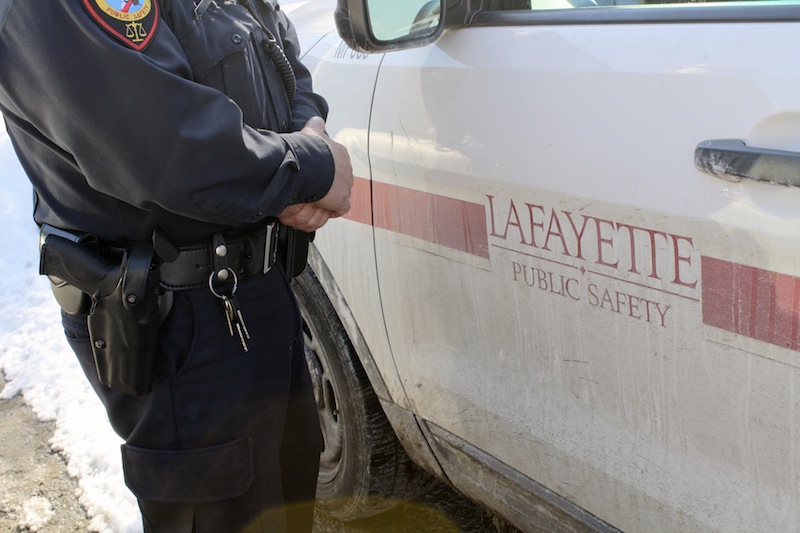Officer Patrick Best patrolling campus with gun and public safety vehicle.
Photo by Elizabeth Lucy ‘15
____________________________
Powers of public safety officers explained
Although the presence of full-fledged police officers on campus and their carrying of guns is not a new development to the nature of public safety, it was recently highlighted with tweets from Lafayette College Public Safety’s twitter account broadcasting the information.
Lafayette has both security officers and police officers that work for public safety. A campus police officer, who can be identified by a dark blue uniform shirt, is actually quite similar to an Easton police officer.
“The police officer has the power of arrest just as any municipal police officer would have,” Sergeant Tony Gallagher said. “The only difference would be that the arrest power is on college property and adjacent streets.”
Power of arrest applies from minor summary level offenses all the way up to a felony level offense.
A summary offense is any minor crime such as speeding, illegal parking, underage drinking or criminal mischief. Possible felony charges include robbery, burglary and rape, according to the Pennsylvania Bar Association.
The majority of arrests made by public safety officers are summary offenses. Underage consumption is the most common arrest made by Lafayette College police officers, according to Gallagher.
In order to become a police officer and hold full arrest powers, officers must attend the police academy and receive 750 hours of training under a state mandate.
“We abide by the Pennsylvania standards,” Senior Associate Director of Public Safety Hugh Harris said. “Our officers go to the same police academy training that any police officer in Pennsylvania goes to. Our officers are trained at the same level as any other municipal police officer. That’s a requirement the college has.”
Security officers receive in-house training, as well as 40 hours of training under another state mandate if they wish to carry a baton on patrol. Recognizable by their light blue uniform shirts, security officers are responsible for public safety tasks that do not involve “law enforcement functions,” Gallagher said.
In-house training consists of fire safety, general procedures for patrolling of campus buildings and enforcing college policies. Security officers also assist police officers as necessary.
“We have part-time and full-time in the security staff,” Harris said. “Many of our security officers are actually police officers somewhere else, but they only act as a security officer here. They have the full police training anyway.”
Lafayette’s public safety police force, while similar in function and scope of powers, is not connected to the police department of Easton.
“It is not a joint department,” Harris said. “We work very closely with the Easton department, on a daily basis. Our officers work very well with them and they work very well with us.”
Lafayette’s police force is not the only one of its kind. More than two-thirds of four-year colleges and universities used police officers with full arrest powers to provide law enforcement services on campus, according to a Bureau of Justice Statistics report of Campus Enforcement for the 2011-12 school year.
Lafayette’s Patriot League neighbor, Lehigh University, has similar policies when it comes to policing the campus.
“It’s the responsibility of the university to protect their students, to protect their community, their faculty and staff,” Lehigh Chief of Police Edward Shupp said. “At Lehigh, we chose to have a police department, so we are prepared to deal with any type of situation that could occur on the campus. A delay in response in dealing with an emergency situation could cost a life so there is no delay when our officers are responding.”
All of Lehigh’s officers carry a firearm, just as Lafayette’s police officer’s do.
“They are trained [to use a firearm]. If a situation warrants it, they would be prepared to use it,” Harris said. “Hopefully that will never occur here. The biggest threat to the community these days that people worry about are active shooter. You hear about it all the time. That’s the main concern. Fortunately we have never had situation like that, and I hope we never do.”
Even though all officers carry a firearm, a Lafayette officer rarely, if ever, has to use it.
“I have been here 32 years. Other than in training, we’ve never fired a shot against somebody,” Harris said. “We’ve never had to use it in the performance of our duty on the campus.”
Despite this fact, some Lafayette students are wary of Public Safety police officers and their right to carry a gun.
“I don’t like the fact that they carry guns,” Alyssa Braver ’16 said. “PSafe should be friends of the Lafayette community and part of it. Guns and arrest power make them seem like more of a threat than a resource.”
Student opinion falls on both sides of the police militarization debate. Some students see the importance of having armed officers policing the community.
“It’s good that a portion have authority in case an emergency comes up,” Hansen Liang ’15 said. “I trust them have that sort of power.”
Regardless, it’s public safety and its officers’ job to protect the Lafayette community.
“We’re here for the safety of the students,” Harris said. “That’s the main goal of all of this.”







































































































ghj • Feb 27, 2015 at 7:20 am
PSafe should be friends of the community? That makes no sense at all. Who knows what kind of problems there would be on campus if not for police on campus? And who knows exactly what kind of situations they already deal with?